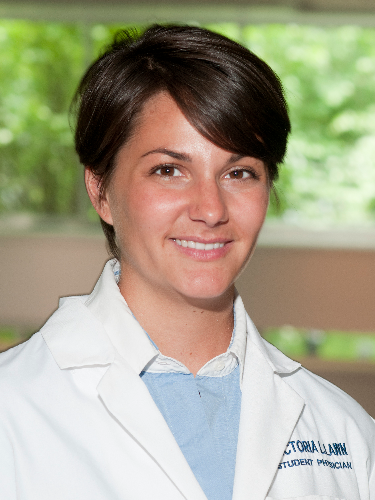Victoria Lawn
DO/MPH '15

Victoria Lawn (DO/MPH '15)
Breaking the Stigma of Mental Illness
Sometimes, a casual conversation can lead to a big idea. That’s exactly what happened
for Victoria Lawn (DO/MPH '15), who met Daniel Lowenstein, MD, professor and vice
chair of neurology at University of California San Francisco (UCSF), on a flight from
Frankford, Germany to India a few years ago. Ms. Lawn and Dr. Lowenstein began talking
about the mental health of medical students, and he told her of a program students
had implemented at UCSF where medical students could share their experiences with
mental health issues in a safe space.
Ms. Lawn was intrigued and began researching how she could bring a similar program
to PCOM. She found that medical students tend to have higher rates of depression than
their peers. Among practicing doctors, she found that women physicians have a 130
percent higher rates of suicide than women in the general population, and about 400
doctors attempt suicide each year.
“The stigma surrounding mental illness—particularly among medical students and physicians—is
a public health problem,” Ms. Lawn says. “How can we address these issues in our patients
if we can’t address them in ourselves?”
To that end, Ms. Lawn—along with Matt Jaffa, DO ’14 and Catherine Babbitt Cook, DO
’14—came up with a program designed to break down that stigma among medical students.
In Fall 2012, they implemented a yearly, three-hour session that second-year students
could take part in, during which students share stories of either their own battles
with mental health issues or of friends’ or family members’ struggles. Students then
break into smaller groups and discuss ways to cope and manage stress while in the
medical profession.
The session is integrated into the “Patient Perspectives” series that occur during
the second year of the neuroscience block of classes in the DO program. Ms. Lawn says
that Denah Appelt, PhD, professor, bio-medical sciences, was instrumental in getting
the session added to the neuroscience block, and that Tina Woodruff, chief student
affairs officer, helped raise awareness of resources students can take advantage of
if they feel themselves struggling. Ms. Lawn also says the timing of the sessions
is key, as national trends show that rates of burnout among medical students is highest
during their third year.
Since the program started, it has grown into a permanent DO Council Committee called
the Student Wellness and Academic Transition Team, which is a group of students and
faculty committed to the mental health and well-being of all students.
Ms. Lawn also studied changes in perceptions among students both before and after
their participation in the session, and found that students were more accepting of
those with serious mental illness and more inclined to self-disclose about their own
issues to a colleague after participating. She presented her findings at the American
Association of Colleges of Osteopathic Medicine’s annual conference in April.
“This is a community-building opportunity,” Ms. Lawn says. “It helps each of us deal
with our own feelings and stress levels, while also teaching us how to care for others.”


